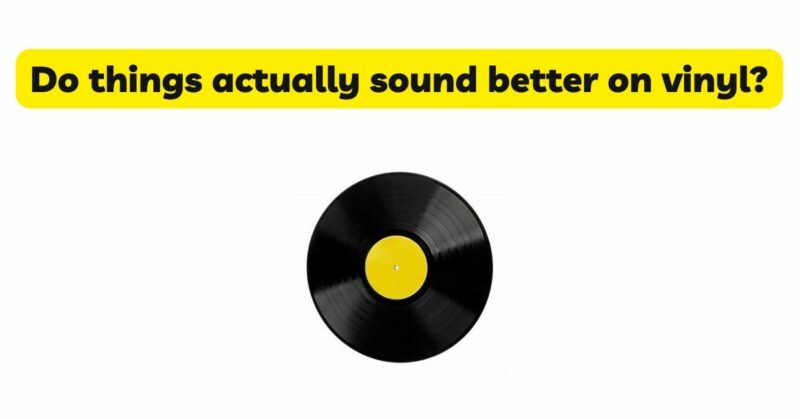The resurgence of vinyl records in recent years has sparked a renewed interest in analog audio and raised the age-old question: Do things actually sound better on vinyl? Vinyl enthusiasts argue that the format offers a unique and superior listening experience, claiming that it captures the true essence of the music. In this article, we will delve into the factors that contribute to the perceived superiority of vinyl and explore the scientific and subjective aspects of its sound quality.
The Analog Warmth:
One of the key aspects often cited by vinyl proponents is the “analog warmth” that vinyl records provide. Analog recordings capture sound by translating the continuous fluctuations in air pressure into physical grooves on the vinyl disc. When played back, the stylus reads these grooves, resulting in a smooth and natural sound. This analog reproduction is often described as warmer, richer, and more organic compared to the digitally sampled sound of CDs and other digital formats.
Dynamic Range and Audio Fidelity:
Vinyl enthusiasts also argue that the format offers a wider dynamic range and greater audio fidelity. Dynamic range refers to the span between the softest and loudest sounds in a recording. Proponents of vinyl claim that it preserves the full range of frequencies and nuances, allowing for a more immersive and detailed listening experience. The analog nature of vinyl records captures subtle variations in the music that may be lost in the digital conversion process of CDs and other digital formats.
Subjective Listening Experience:
Sound quality is inherently subjective, and personal preference plays a significant role in determining whether something sounds better on vinyl. Many listeners appreciate the unique characteristics of vinyl, such as the occasional crackles, pops, and surface noise, which can add to the nostalgic and authentic appeal of the format. These imperfections are sometimes perceived as part of the overall listening experience and contribute to the charm of vinyl records.
Psychological and Emotional Factors:
There are psychological and emotional factors that come into play when assessing the perceived superiority of vinyl. The tangible nature of vinyl records, the large album artwork, and the act of physically handling and playing a record can create a more engaging and immersive listening experience. The ritualistic nature of vinyl, including carefully selecting a record, gently placing it on the turntable, and manually lowering the stylus, can enhance the emotional connection with the music.
Equipment and Setup:
To truly appreciate the potential superiority of vinyl, it is important to consider the equipment and setup used for playback. High-quality turntables, cartridges, amplifiers, and speakers designed for vinyl playback can significantly enhance the sound quality. Audiophiles who invest in high-end audio equipment, along with proper room acoustics and speaker placement, can achieve optimal results when playing vinyl records.
Addressing Limitations:
While vinyl records offer unique qualities, it is essential to address the limitations and challenges associated with the format. Vinyl is susceptible to wear and degradation over time, which can affect sound quality. Surface noise, clicks, and pops can be distracting and diminish the overall listening experience. Moreover, the playback process requires proper maintenance and care to ensure accurate reproduction.
Digital Advancements:
It is worth noting that digital technology has made significant advancements in recent years. High-resolution digital formats, such as lossless audio files and high-quality streaming services, offer audio quality that rivals or even surpasses vinyl. With advancements in digital-to-analog converters (DACs) and high-fidelity audio equipment, it is possible to achieve exceptional sound quality in the digital realm as well.
Conclusion:
The debate surrounding whether things actually sound better on vinyl is multifaceted, involving both scientific and subjective aspects. Vinyl records provide a unique and nostalgic listening experience, often characterized by analog warmth, wider dynamic range, and emotional engagement. However, personal preference, equipment quality, and the listening environment all play significant roles in determiningwhether one perceives vinyl as superior to other formats. While vinyl may offer distinct qualities, digital technology has also advanced, providing high-resolution audio and excellent sound reproduction. Ultimately, the preference for vinyl or other formats boils down to personal taste and the desired listening experience. Whether you choose vinyl for its warm and nostalgic appeal or embrace digital formats for their convenience and fidelity, the joy of music lies in the ears of the beholder.


